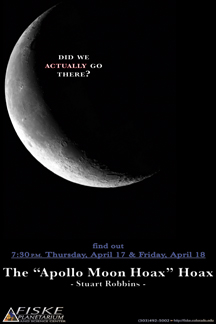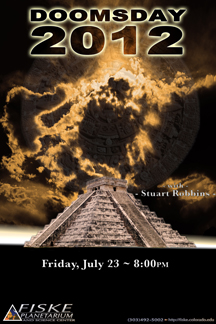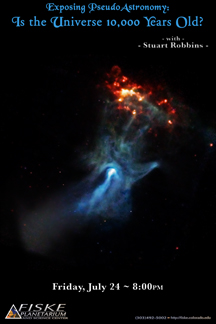I do a fair amount of public outreach in terms of promoting both astronomy and critical thinking as related to science. Some of this was connected with my graduate school department, most of it is connected with the University of Colorado at Boulder, and some of it is completely separate. I am also interested in general science education in America and have taught some classes/labs.
Public Lectures / Planetarium Shows
(in order of how much I enjoy them)
How Your Camera Lies to You: From Ghosts to UFOs, a Skeptics' Guide to Photography: I have given this presentation four times, once in conjunction with Bryan of the Rocky Mountain Paranormal Society at the James Randi Educational Foundation's "The Amazing Meeting" in Las Vegas in 2013. It's a great presentation where we go through numerous common photographic anomalies, how they are used as "evidence" for paranormal claims, and what's actually going on. |
|
The Saga of the Lunar Ziggurat: This presentation grew out of an online and print spat I had with a particular pseudoscientist who ended up dedicating an entire foreword to one of his books about how much I'm wrong. One of those, "You know you've made it as a skeptic when ..." moments. This presentation builds on that, examines the claim, and it looks at the aftermath, particularly with how the disagreement played out and the method of argument itself. |
|
The Apollo Moon Hoax: Why We Did NOT Not Go to the Moon: This was effectively my introduction to formal scientific skepticism without actually realizing it. This hour-long lecture with photos and videos seeks not to prove that we did go to the moon, but to disprove the idea that we didn't. I address a myriad of hoax claims and show why each and every one of them is without merit. I have given this show over a half a dozen times, mostly at the Fiske planetarium on the CU-Boulder campus, but also at the 2007 Denver Skepticamp. It's still my favorite. I haven't given it in a few years, though, but I'd like to and if I were to, I would definitely do some revision that would include a review towards the end of common things to watch out for in regards to conspiracy-type claims. I revised the talk and gave it again after a three-year hiatus at the August 2011 Colorado Springs Skepticamp (a live recording of it was featured as Episode 7 of my Exposing PseudoAstronomy podcast). I made the poster for the presentation. |
 |
Apocalypse 2012: Death by the Mayans, Pole Shifts, or Galactic Alignments?: This one is fun. I first presented it at the 2010 Denver Skepticamp in June '10 and I presented it again at Fiske a month later in July '10. The show goes through a little of the history of the 2012 phenomenon, and then it discusses some of the major ideas out there for why the world will end. I talk about Planet X, geographic pole shifts, magnetic pole shifts, galactic alignments, and the sun, and I try to bring in some humor (as usual with my shows/lectures). This is a fun one - and timely - but it's only good for another two years! This was recorded and made it on as Episode 143 of the Dogma Free America podcast if you would like to listen. The Fiske version of this lecture/show/presentation was probably my most usage of the capabilities of the planetarium, including using the star projector twice and numerous special effects. It can still be done - like all my shows/lectures - without the use of a planetarium, though. I made the poster for the presentation. |
 |
Exposing PseudoAstronomy: Is the Universe 10,000 Years Old: This is a show that, even though I've given twice, I am still not completely satisfied with it. That is mainly because I need so much time to really get into each claim that I can only address five during the presentation. I first presented it at the 2009 Denver Skepticamp in May '09 and I presented it again at Fiske in July '09. The show is of five major young-Earth creationism claims or interpretations of astronomy and why they're fallacious. This is my first show where I really address formal logic, and it is also (I expect) my most contentious show. My approach to the religious implications is that the audience is free to believe whatever they want in terms of religion. But, when that religion makes specific scientific claims or predictions, then I am free to address them and show where they may be wrong given the actual science. Actually, due to the subject matter, I was required by the planetarium to change the title to, "Exposing PseudoAstronomy: Is the Universe 10,000 Years Old?" I made the poster for the presentation. I presented a related talk, "GAPS Young-Earth Creationists Must Believe or Ignore (Geology, Astronomy, Physics)," at the May 2012 Denver Skepticamp. |
 |
Physics for Skeptics: Why [Insert Field of Choice] Does Not Prove [Insert New-Age Idea of Choice]: I presented this talk at the 2011 Boulder/Denver Skepticamp as a half-hour show. I went through three main "fields" of claims, namely quantum mechanics, the second law of thermodynamics, and concept of "energy." I showed how some people use them to justify their own particular pseudoscience and then why they don't actually show what those people think they do. |
|
Poor, Pitiful Pluto: Planet No Longer?: This was a show I put together to discuss why the IAU opted to re-classify Pluto as a "Dwarf Planet." I discuss the history of what a "planet" has been, why we needed a definition, and possible alternatives. I have only given this show once. |
Professional Research Conferences
Teaming up with Bill Bridgman of the Crank Astronomy website, and others, we worked together to submit an abstract to the January 2014 meeting of the American Astronomical Society to argue about how professional research scientists should not just ignore cranks and pseudoscientists, but to show how we can use their material and claims to teach real science and the scientific process.
Bridgman, W.T., Young, C., and S.J. Robbins. (2014) Crank Astronomy as a Teaching Tool. II. Amer. Ast. Soc., 223, #451.05. Link to the Abstract
Presentation as a Document | Example Problem Set to Use in the Classroom
Teaching
Instructor of Record: In Summer 2010, I taught ASTR 1110 (Introductory Astronomy, The Solar System, for Non-Majors, Non-Lab). This was a month-long, semester's-worth of material course every day for an hour and a half. I also taught a graduate-level seminar on impact craters in Spring 2013.
Labs: I have taught introductory astronomy labs for two semesters for non-majors.
Classes: I have guest-lectured in astronomy classes for non-majors at the college level as well as some high schools (see CPAG below). In Summer 2010, I also taught ASTR 1110 through my department at CU Boulder. The class is Introductory Astronomy (The Solar System) for Non-Majors, Non-Lab.
Astronomy Outreach through CU-Boulder
Public Observatory Openhouses: I volunteered for these as a graduate student at least three times per year, usually more, through my department and the associated Sommers-Bausch Observatory (SBO) on campus. In addition to the regular open houses every Friday, I pretty much always also help out with special events like the 2006 Transit of Mercury, the 2008 Lunar Eclipse, and the annual Astronomy Day.
CPAG (Colorado Project Astro-Geo): I became involved with CPAG for the 2008-09 academic year. This is a program that places "professionals" (grad students, faculty, engineers, etc.) in astronomy or related fields into K-12 classrooms at least 4 times throughout the school year. I have or will be lecturing to high school Juniors and Seniors about extra-solar planets, Mars, and Saturn in the Arvada West school district.
Science Fair Judge: Perhaps expected of a "scientist," I have enjoyed judging the Roche-sponsored Boulder Valley School District science fair every Spring since 2009. I have judged physics, environmental science, and earth & space science categories. For 2011, I will the the Head Judge in the earth & space science category which, besides standard judging, includes me making the final decision on 1st, 2nd, and 3rd places in the category for both high school and middle school.
Other Public Outreach
Astrophotography Guides: So far, I have written three astrophotography guides, one for general astrophotography with a consumer to prosumer camera, a second for lunar astrophotography, and a third for photographing lunar eclipses.
Denver Skeptics / Skepticamp: I joined the Mile-High Skeptics (previously called the "Denver Skeptics") in the Fall of 2008 and have been somewhat active in the group, including the annual Skepticamp (presented at the first one in 2007, skipped 2008, presented in 2009, 2010, and 2011). My show the first year was on the Moon Hoax, 2009 was an early version of my Young-Earth Creationist show (above), 2010 was an abbreviated version of my 2012 Doomsday show, and 2011 I presented on physics for skeptics (why [insert physics word] doesn't prove [insert new age idea]).
Exposing PseudoAstronomy Blog and Podcast: I started this blog in September 2008 to really address what I see as the bad astronomy (can't use that name - it's taken by Phil Plait) in the media and popular culture. A lot of it has (so far) focused on the low-hanging fruit of religious claims from young-Earth creationists, but I have also branched out into the "dark side" of the moon, Apollo moon hoax, and other areas, including a few that will be addressed later such as astrology and UFOs. I also have a rather extensive exposé on the whole Planet X and 2012 nonsense. I started the podcast in August 2011 to cover similar material but to reach a new or broader or different audience.
Podcast / Radio Interviews: I'm a "regular" guest on The Conspiracy Skeptic podcast, produced by Karl Mamer. I have also been interviewed on the Rational Alchemy radio show (and podcast) and by Nancy Atkinson (of Universe Today) for the 365 Days of Astronomy podcast about my work with Moon Zoo and my Mars craters. I've also been on the Rocky Mountain Paranormal Society's WarningRadio show.
AAAS's Science and Entertainment Exchange: I'm a member scientist of the American Association for the Advancement of Science's "Science and Entertainment Exchange" that attempts to pair scientists with directors, producers, and writers in the book, television, and film industry. So far, I have advised two screenwriters through this program.